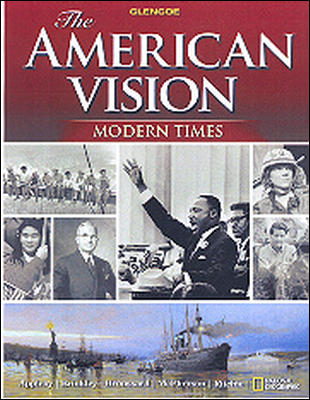
The American Vision: Modern Times © 2008Chapter 17: The New Frontier and the Great SocietyChapter OverviewsThis chapter looks at the domestic policies of the Kennedy and Johnson administrations and the Cold War fears that traced Kennedy's foreign policy decisions. Section 1 discusses President John F. Kennedy's domestic policies and the Supreme Court during the Kennedy years. In 1960 a young, energetic, and wealthy John Kennedy won the race for the White House in a highly publicized television campaign. While President Kennedy had high hopes for his legislative agenda—the New Frontier—Congress defeated a number of his proposals. He succeeded, however, in applying deficit spending and supply-side economics to strengthen an ailing economy. Kennedy also helped to promote women's rights, increase the minimum wage, and supply aid to distressed areas. The Supreme Court, headed by Chief Justice Earl Warren, played a pivotal role in shaping national policy during the Kennedy years. In a series of rulings, the Court took a forceful stand on issues that affected the nation's political process, the civil liberties of individuals, and the operation of the criminal justice system. Section 2 describes how Cold War fears challenged the foreign policy decisions of the Kennedy administration. When Kennedy took office, the Cold War was in full swing, and the threat of nuclear war was on everyone's minds. Kennedy attempted to reduce the threat of nuclear war and to stop the spread of communism with a range of programs that included a conventional weapons buildup, foreign aid, and the Peace Corps. The United States got an edge in the space race when the president authorized a significant expansion of the space program. Kennedy's efforts to combat Communist influence led to some of the most intense crises of the Cold War. At the Bay of Pigs in Cuba and in Berlin, Germany, tensions heightened as the Americans and Soviets each tried to prove their strength. In 1962 the two nations came dangerously close to nuclear war over the issue of Soviet missiles in Cuba. Just as the first steps were taken toward American-Soviet arms reduction, Kennedy's life came to a sudden and tragic end. Section 3 describes President Lyndon B. Johnson's slate of domestic programs. During his years in the Senate, Johnson had earned a reputation as a hard-working, hard-talking Texan with the ability to get things done. After being sworn in as president, Johnson used his talents to push through Kennedy's initiatives. He then worked with Congress to create his own plan to combat poverty and racial injustice. The "Great Society" encompassed a multitude of programs, and it represented Johnson's vision of what the United States could and should become. His ambitious program included health insurance for the elderly and low-income families, funding for education, and consumer and environmental protection. Johnson also worked to provide financial assistance to deteriorating inner cities and to lift discriminatory immigration restrictions. While in many ways the success of the Great Society was limited, its programs started Americans debating what the government can and should do to help disadvantaged citizens. |  |















